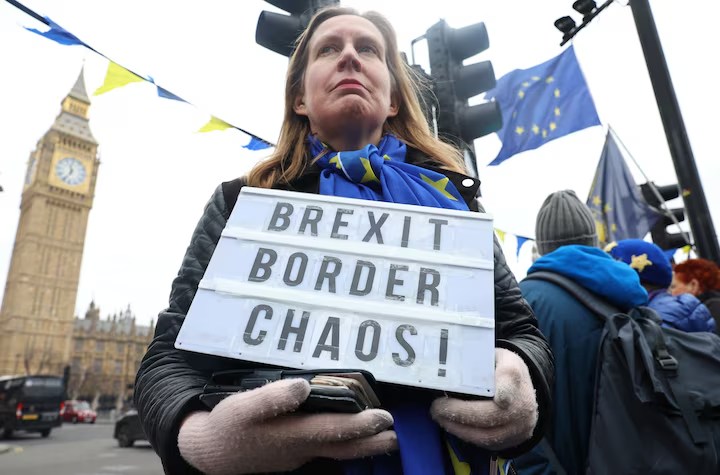
For a decade, leaving the European Union was the question that dominated British politics. These days it barely comes up. Which is clearly how Labour Party leader Keir Starmer likes it.
He has worked diligently to win back the support of working class voters, millions of whom were lured away five years ago by Conservative Boris Johnson’s promise to “get Brexit done”, when Labour campaigned to leave a path open to stay in the EU.
Starmer’s reward is polls that now predict him sweeping into Downing Street as prime minister at the end of this week, possibly with a historic majority. But if he does get there, he won’t be able to keep Brexit out of the news for long.
His mandate will be to spur economic growth. Businesses say that would require lifting some of the barriers that Britain’s exit from the EU has left in the path of their trade. And that, in turn, is likely to mean reopening contentious negotiations with Brussels.
Britain finally left the EU in January 2020 under Johnson. In its determination to turn the page on Brexit, Labour has ruled out rejoining the EU single market or customs union. But it says it is still possible to remove trade barriers with the 27-nation bloc, to help companies, particularly smaller ones, which have struggled with higher costs and paperwork.
Labour does not want to “reopen the wounds of the past,” said Jonathan Reynolds, the Labour lawmaker who is in line to become business secretary in a Starmer cabinet.
“Clearly, we need to get a better deal, and there are real improvements we could achieve,” he said at an event on Thursday hosted by the British Chambers of Commerce (BCC), the business lobby group which has said parties should stop “treading on eggshells” over EU ties.
A survey, opens new tab by accountancy firm Menzies showed that 1 in 3 British businesses want to reopen the Brexit deal reached under Johnson, and 1 in 5 want a new government to rejoin the single market, with 20% citing barriers as a result of Brexit as a factor limiting international expansion.
‘LIKE-MINDED PARTNER’
One early pledge from Labour is to seek a veterinary agreement with the EU that would reduce border checks on animal products, a hindrance for British farmers and importers. It also wants the mutual recognition of certain professional qualifications, and easier access for artists on tour.
Labour has presented these as comparitively simple gains it can make without reopening the Brexit agreement reached under Johnson.
But even such small steps would require tough choices, said an EU source, speaking on condition of anonymity to discuss hypothetical future negotiations.
A veterinary agreement would require Britain to submit to resolving disputes through the European Court of Justice (ECJ) the EU source said. That is anathema to Brexit campaigners who consider it an infringement of British sovereignty.
“Working with a like-minded partner, friend and ally is what everybody wants,” said the EU source. “But the idea of having the same benefits you get as a member of the club becomes a little bit trickier.”
Anand Menon, a politics professor and director of the UK in a Changing Europe think tank, said Labour might be misjudging how enthusiastic the EU would be about renegotiating after years of clashing with British governments.
The bloc already has a lot on its plate, he said. And while Britain may want to improve technical issues on areas like food, Brussels would want to talk about mobility – making it easier for people to live and work in Britain, especially young people.
“I think we’ll have a massive change in style, and a bit of tinkering in substance,” Menon said.
The Conservatives say Labour’s policies would “unravel Brexit”, including by making Britain again subject to rulings from the ECJ.
Prime Minister Rishi Sunak in a debate this week accused Labour of planning to accept a return to free movement of people under its plans to strike a better Brexit deal with the EU. Starmer said he would reject any deal with the EU that increases immigration.
Labour’s Reynolds said he wanted to improve the trade situation while offering benefits to the bloc: “It’s not necessarily easy, but there’s a negotiation, there’s a process I can see delivering those things.”